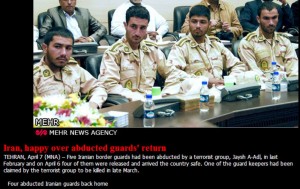ISI Goes After Geo’s Broadcast License in Response to Accusations on Mir’s Shooting
On Saturday, Hamid Mir, the most popular news anchor on Geo, Pakistan’s largest television news outlet, survived an assassination attempt. He remains hospitalized with at least six bullet wounds. Controversy has swirled since the attack, with Mir’s brother Amir Mir, also a journalist, accusing Pakistan’s ISI of being behind the attack. ISI has responded by approaching the broadcast regulatory authority in Pakistan, demanding that Geo’s license be revoked.
The Committee to Protect Journalists has denounced the move by the ISI:
The Committee to Protect Journalists is greatly concerned by actions brought by Pakistan’s Inter Services Intelligence Directorate (ISI) against Geo Television today. In its complaint to the Pakistan Electronic Media Regulatory Authority, the ISI accused Geo’s parent company, the Independent Media Corporation, of conducting a “false and scandalous campaign undermining the integrity and tarnishing the image of state institution (ISI) and its officers.”
The media regulator has the authority to shut down broadcasters based on such complaints, and has done so under previous administrations of Pakistan.
“We call on the Pakistan Electronic Media Regulatory Authority not to act on this spurious complaint, and we call on Pakistan’s security services to recognize the critical role of the media and exercise tolerance and maturity,” said Bob Dietz, CPJ’s Asia program coordinator. “The ISI is free to rebut allegations in the media but should not try to censor coverage.”
Declan Walsh covered the move by the ISI in the New York Times on Tuesday:
Mr. Mir survived the attack and is being treated for gunshot wounds to the chest and shoulder. But as he was still receiving emergency treatment, Geo prominently broadcast heated accusations from Mr. Mir’s brother, the journalist Amir Mir, who accused the ISI of being responsible for the attack.
During extended commentary, Geo also repeatedly broadcast a photograph of the ISI chief, Lt. Gen. Zahir ul-Islam, while a senior journalist employed by the station called for the general to resign.
Hamid Mir, whose pugnacious style has frequently stirred up controversy, has been a fierce critic of the military, and in February he privately told station managers that he had received a threat from ISI operatives about his work, according to the station. In November 2012, a bomb was found strapped to the underside of his car outside his home in Islamabad.
/snip/
On Tuesday, evidently, the generals decided they had had enough criticism.
In a four-page letter to the state-run Pakistan Electronic Media Regulatory Authority, the Defense Ministry not only asked for Geo’s broadcasting license to be revoked, but called for the body to initiate criminal proceedings against Geo editors and management.
This had to be a difficult story for Walsh to cover, considering that he was mysteriously kicked out of Pakistan last May, just as elections were taking place. Walsh also this morning tweeted a link to an article in the Guardian that contains an explosive quote from the president of Geo News:
Geo’s president – a former newspaper editor named Imran Aslam – became wistful when defending his channel’s coverage after the assassination attempt on Mir. “There was a time that if they didn’t like what you wrote they censored you. They cut out a word or a line. If they got really angry they got your editor fired. Now they just shoot you.” A bullet in the head is the new form of censorship in Pakistan.
Interestingly, just after the bomb was defused on Mir’s car in November of 2012, coverage suggested that it may have been planted by the TTP, especially since Mir had been covering the TTP’s shooting of Malala Yousafzai. In an AP story carried in the Washington Post, we have this on Mir’s more recent reporting:
In recent weeks, Mir’s show gave prominent coverage to a group campaigning against the disappearances and torture of insurgents and their supporters in southwestern Baluchistan province — allegedly at the hands of ISI.
Geo is reporting that Hamid Mir is expected to make a public statement later today. I will keep an eye out for it.
Update: The Express Tribune just posted on Mir’s statement:
In a statement read out by his brother on Thursday, senior journalist Hamid Mir said that he faced threats from both state and non-state actors, Geo News reported.
On Saturday, April 21, unknown assailants shot at Mir in Karachi, critically injuring him.
Through his first official statement since the attack, Mir claimed that he had recently been approached by intelligence officers who informed him that he was on a hit-list.
He said he is making this statement despite the pressure he is facing from various quarters.
The ISI was upset with me for my coverage of Mama Qadir’s Long March, he added.
I forwarded the numbers from which I received death threats to the police, the statements reads, but the police did not do anything about it.

